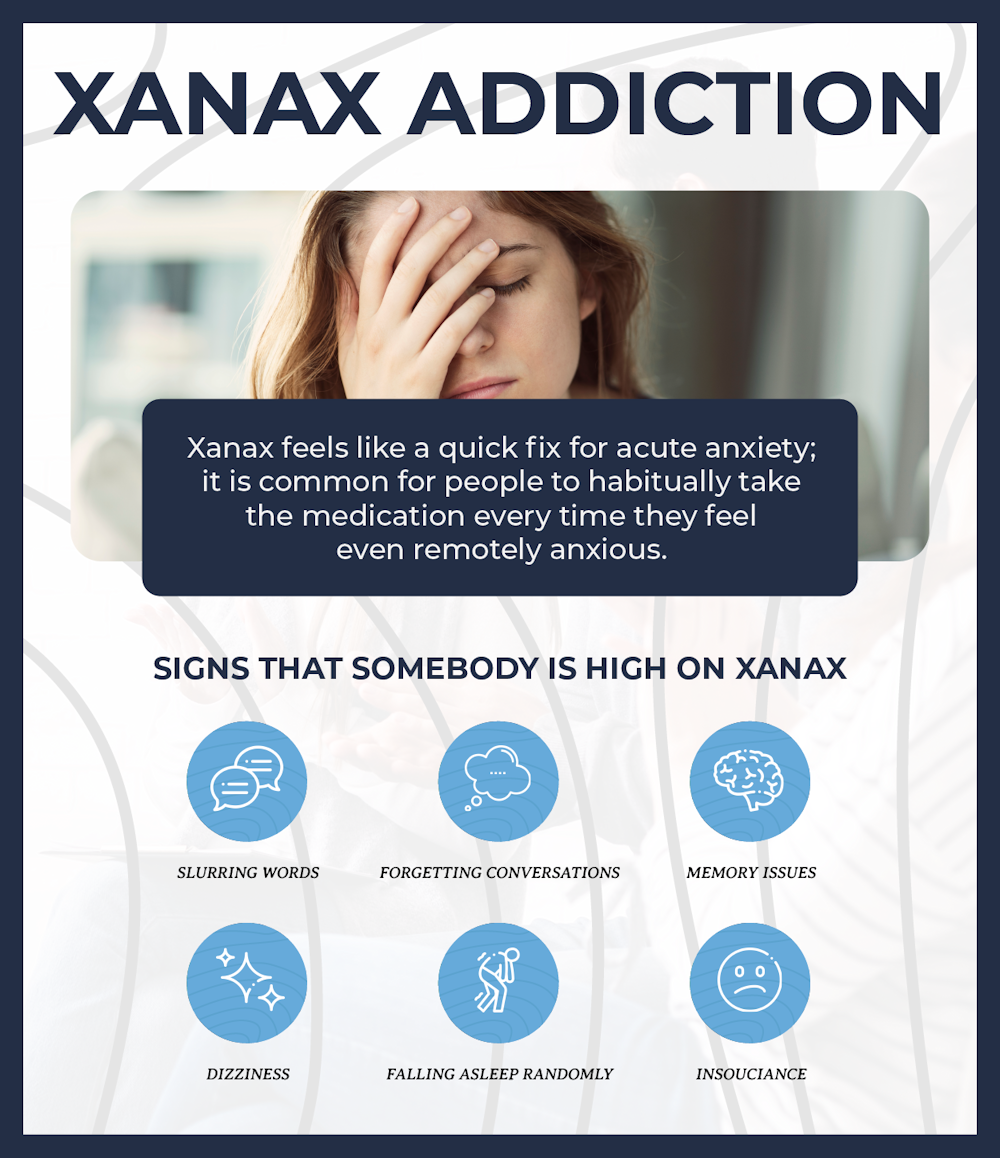Alprazolam (Xanax) is a popular benzodiazepine in the U.S. Like all benzodiazepines, Xanax is a central nervous system depressant designed to calm patients experiencing life-threatening panic episodes. It is not an antidepressant and not a painkiller. Benzodiazepines were developed in the 1960s as a safer tranquilizer than alcohol and barbiturates. However, when used in excess, benzodiazepines like Xanax cause intoxication and withdrawal symptoms that are similar to those experienced by people with an alcohol or barbiturate addiction.
Kicking a benzodiazepine dependence without assistance from Xanax addiction treatment in Portland often results in sustained periods, sometimes years or decades, of intoxication and dysfunction.
Physical Effects of Xanax Abuse

Xanax feels like a quick fix for acute anxiety; thus, it is common for people to habitually take the medication every time they feel even remotely anxious. It can affect different people in very different ways, but a common theme most Xanax users share is a rapid increase in tolerance with daily usage. A person who seems drunk but isn’t drinking might be on Xanax. Signs that a person is “barred out” (on a high dose of Xanax) can include the following:
- Slurring words
- Forgetting conversation points
- Memory impairment
- Dizziness
- Falling asleep randomly
- Insouciance
Using Xanax recreationally, habitually, excessively, or in combination with other drugs results in severe consequences for many people. Xanax had a high misuse liability, meaning it is very easy to become dependent on it. Even taking it as prescribed by a doctor can lead to chemical dependency. Victims of abuse, PTSD, and sexual violence sometimes use Xanax to escape their emotional pain.
Long-Term Effects of Xanax
While this benzodiazepine might offer some temporary respite, it will not treat the underlying causes of anxiety (or help a person heal from them). Side effects of long-term Xanax use include many health concerns, including:
- Insomnia
- Constipation
- Abdominal cramping
- Gastrointestinal problems
Many Xanax users feel lethargic but also unable to sleep. This may lead them to use additional harmful substances.
Side Effects of Xanax Addiction
Xanax side effects aren’t just long-term. Individuals who are just using the drug casually can still struggle with adverse side effects. Just a single use can result in unpleasant side effects.
People who take Xanax can experience a deterioration in cognitive function right away. Users may begin to notice slurred speech or blurred vision. It’s common to feel very disoriented, as well. In some cases, taking Xanax can feel similar to the confusion of consuming heavy amounts of alcohol.
Increased Tolerance, Dependency, and Addiction
 The addictive nature of Xanax is perhaps one of the most worrying side effects. Physicians never intended Xanax as a long-term solution for any problem. Nonetheless, certain patients take it for far longer than the maximum recommendation of six weeks because Xanax can be addictive.
The addictive nature of Xanax is perhaps one of the most worrying side effects. Physicians never intended Xanax as a long-term solution for any problem. Nonetheless, certain patients take it for far longer than the maximum recommendation of six weeks because Xanax can be addictive.
Over time, the chemistry of the brain changes as a result of Xanax consumption. If Xanax is no longer available, the body and the brain won’t function properly without it. This different function is the basis for dependency.
The body also increases its tolerance to Xanax over time. People may find that a dose that felt sufficient in the past no longer feels like enough. Those same people might start to look for new sources of this drug, even resorting to illegal measures.
Mood Disorders and Psychological Concerns
Patients with mental health concerns often receive prescriptions for Xanax. Unfortunately, using Xanax can actually make some conditions worse. It can also introduce new mood disorders or psychological problems. Xanax overuse commonly leads to depression. It can also cause hallucinations or delirious states. In some cases, using Xanax can lead to aggression, violence, and even psychosis.
Rapid Weight Loss
Many people notice that Xanax impacts their weight. In a few cases, users can gain weight because they reduce their activity levels. In more cases, Xanax can lead to unhealthy weight loss.
For many individuals, Xanax is an appetite suppressant. If you add low appetite to lethargy, rapid weight loss or even malnutrition is likely. This kind of weight loss is rarely healthy and can be risky.
Memory Problems
One of the most common long-term side effects of Xanax use is memory loss. Typically, users experience short-term memory loss. Hours of time can go missing from memory altogether, and that memory loss is usually permanent.
Risk of Overdose
Every time a person ups his or her dose of Xanax, the risk of overdose increases. The longer an individual uses the drug and the higher the dose, the greater the risk. People experiencing a Xanax overdose often suffer from a slowed respiratory system, which makes breathing very difficult. If you overdose on Xanax, you could suffer from a coma or even death.
Ending a Dependence on Xanax
Addiction treatment is the only way to end Xanax side effects. After detox, patients can begin rehab at Crestview Recovery. In addiction rehab, treatment methods include:
- Individual therapy: Patients work with a therapist one-on-one to understand the root cause of their addiction and develop healthy coping mechanisms.
- Trauma therapy: For patients who have experienced trauma in their lives. In trauma therapy, patients work with a therapist to process their trauma and develop healthy coping mechanisms.
- Dual diagnosis treatment: For patients who have a mental health disorder in addition to their addiction. In dual-diagnosis treatment, patients receive treatment for both conditions simultaneously.
- Group therapy: Patients meet with other people in recovery to share their experiences and support one another.
- Fitness and experiential therapy: These help patients heal their bodies and minds. In fitness therapy, patients participate in activities like hiking and yoga. In experiential therapy, patients participate in activities like art and music therapy.
Escaping a Xanax addiction is challenging but possible. Get help at Crestview Recovery in Portland, Oregon. Begin your journey to health and recovery by calling or filling out a contact form today!
































